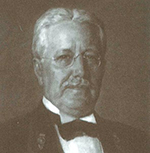The Eldridge Reeves Johnson Foundation Professorship of Biochemistry & Biophysics

The Eldridge Reeves Johnson Foundation for Medical Physics was established in 1929 and was funded by Mr. Johnson, a member of the Board of Trustees of the University of Pennsylvania for 20 years and the Founder and President of the Victor Talking Machine Company.
The Professorship was created to facilitate the study and development of physical methods in the investigation of disease. Mr. Johnson believed that the study of physical properties such as light, heat, electricity, and sound could do much to increase understanding of the human body. The Johnson endowment, which provided for facilities and equipment, was the first grand effort to join physics and medicine in a closer union.
 Current Chairholder
Current Chairholder
Ben Black, PhD
Ben Black is the Eldridge Reeves Johnson Foundation Professor of Biochemistry & Biophysics at the University of Pennsylvania and Co-Director of the Penn Center for Genome Integrity. He also co-directs Penn’s Graduate Training Program in Structural Biology & Molecular Biophysics and is a member of the Penn Epigenetics Institute and the Abramson Cancer Center.
The longest-standing goal of Dr. Black’s lab has been to understand how particular proteins at the centromere direct accurate chromosome segregation at mitosis and meiosis. His team defined the epigenetic centromere mark to be an octameric nucleosome containing the histone H3 variant, CENP-A. The team also contributed to the discovery and characterization of the biochemical pathway that propagates the centromere epigenetic mark through cell cycle–coupled CENP-A chromatin assembly. This discovery yielded the most prominent current molecular model for the self-propagation of centromeric chromatin. Dr. Black and his team used this understanding to develop a new type of artificial chromosome that removes a key barrier limiting mammalian synthetic biology efforts.
Dr. Black has taught in or co-directed more than a dozen different courses in Penn’s Biomedical Graduate Studies (BGS) programs, School of Arts & Sciences, and Perelman School of Medicine. He has served on NIH review panels and as a reviewer for many national and international funding agencies. He is Associate Editor of Science Advances and the Biochemical Journal and serves as a reviewer for more than 25 scientific journals, including Nature, Science, and Proceedings of the National Academy of Sciences (PNAS). He has given invited lectures at numerous universities and meetings in the U.S. and in more than a dozen foreign countries.
Dr. Black has been recognized for his work with a fellowship from the American Cancer Society, the Career Award in the Biomedical Sciences from the Burroughs Wellcome Fund, the Rita Allen Foundation Scholar Award, and the Charles E. Kaufman Foundation Initiative Award. At the Perelman School, he has won the Michael S. Brown New Investigator and Stanley N. Cohen Biomedical Research Awards as well as the inaugural Perelman School of Medicine Dean’s Innovation Award. He has also received Penn’s Discovering the Future grant. In 2021 he was selected for the prestigious NIH Director’s Transformative Research Award.
Previous Chairholders
- Detlev Wulf Bronk, MD 1929–1949
- Britton Chance, PhD, DSc, MD (Hon) 1949–1983
- P. Leslie Dutton, PhD 1991–2019

